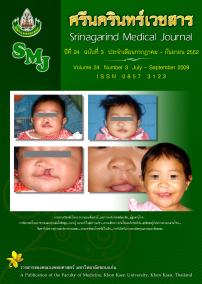ThaiScience
ThaiScience
SRINAGARIND MEDICAL JOURNAL
Volume 36, No. 01, Month JANUARY, Year 2021, Pages 61 - 67
Antihypertensive and antioxidative effects of asiatic acid in rats with long-term exposure to cadmium
Akarachai Tubsakul, Weerapon Sangartit, Poungrat Pakdeechote, Veerapol Kukongviriyapan, Upa Kukongviriyapan
Abstract Download PDF
Background and objective: Cadmium (Cd) is a toxic heavy metal which causes oxidative damage to various tissues and associated with hypertension. Antioxidants have been used to protect against Cd intoxication. Asiatic acid (AA) is a pentacyclic triterpenoid extracted from Bua-Bok (Centella asiatica) and possesses strong antioxidant activities. This study aimed to investigate whether AA could attenuate hypertension and oxidative stress in rats chronically exposed to Cd. Methods: Male Sprague-Dawley rats were exposed to Cd daily via consumption of water containing 10 ppm cadmium chloride for 16 weeks. Rats in the control groups received deionized water as drinking water. AA (15 or 30 mg/kg b.w.) was orally administered once daily for the last 4 weeks of the experiment. Results: Cd induced hypertension in rats by increasing arterial blood pressure and peripheral vascular resistance. Cd significantly attenuated the vasodilating responses to acetylcholine (p < 0.05) while the vasodilating responses to sodium nitroprusside were unchanged. AA in a dose-dependent manner significantly improved hemodynamics and increased endothelial-dependent responses (p < 0.05). AA alleviated oxidative stress, enhanced blood glutathione and increased plasma nitrate/nitrite level. Moreover, AA also reduced the accumulation of Cd in blood and vascular tissues.Conclusions: These results suggest that AA is a pro tective antioxidant against Cd-induced hypertension, endothelial dysfunction and oxidative stress
Keywords
Asiatic acid; Cadmium; Hypertension; Nitric oxide; Oxidative stressSRINAGARIND MEDICAL JOURNAL
Published by : Faculty of Medicine, Khon Kaen University
Contributions welcome at : http://www.smj.ejnal.com/e-journal/journal/index.php
